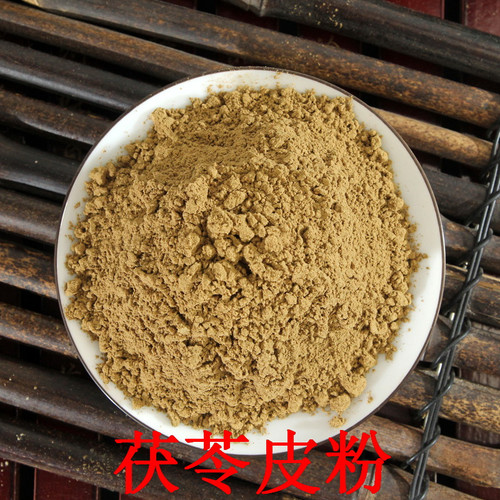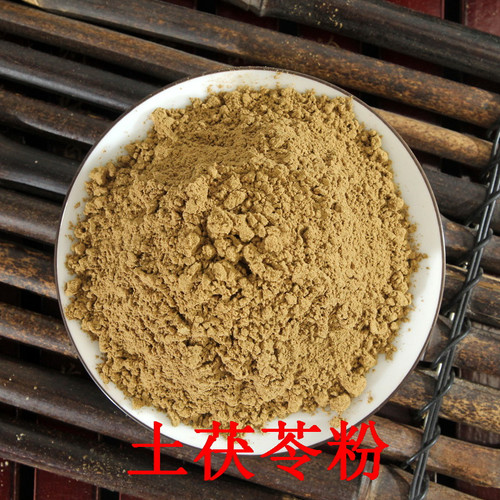Product Overview
Parts used: Dried sclerotium
TCM category: Herbs that drain Dampness
TCM nature: Neutral
TCM taste(s): Sweet
Meridian affinity: Spleen Heart Kidney Lung
Scientific name: Wolfiporia extensa
Other names: Hoelen, Poria, Tuckahoe, China root, Matsuhodo
Use of poria-cocos mushrooms (Fu Ling) in TCM
Please note that you should never self-prescribe TCM ingredients. A TCM ingredient is almost never eaten on its own but as part of a formula containing several ingredients that act together. Please consult a professional TCM practitionner, they will be best able to guide you.
Preparation: Soak in water, wash, steam slightly, remove the outside skin, cut into pieces or thick slices, dry.
Dosage: 10 to 15g
Main actions according to TCM*: Encourages urination and drains Dampness. Tonic to the Spleen/Stomach. Assists the Heart and calms the Spirit.
Primary conditions or symptoms for which poria-cocos mushrooms may be prescribed by TCM doctors*: Insomnia Oliguria Diarrhea Palpitations Restlessness
Contraindications*: Should not be used when there is frequent and copious urination when associated with a Cold Deficiency.
Common TCM formulas in which poria-cocos mushrooms are used*:
For Damp-Cold jaundice combine poria-cocos mushrooms with dried ginger (Gan Jiang), prepared aconite (Zhi Fu Zi) and virgate wormwood (Yin Chen).
For Dampness and edema combine poria-cocos mushrooms with polyporus (Zhu Ling), water plantain (Ze Xie), atractylodes rhizomes (Bai Shu) and cinnamon twigs (Gui Zhi).
For urinary incontinence combine poria-cocos mushrooms with yam (Shan Yao).
For food poisoning and overindulgence in rich and greasy foods or alcohol with symptoms of abdominal bloating, belching and acid regurgitation combine poria-cocos mushrooms with hawthorn berries (Shan Zha), radish seeds (Lai Fu Zi), medicated leaven (Shen Qu), tangerine peel (Chen Pi), crow-dipper rhizomes (Ban Xia) and forsythia fruits (Lian Qiao).
For irritability, restlessness, nervous anxiety and insomnia combine poria-cocos mushrooms with lotus seeds (Lian Zi), lily bulbs (Bai He), glehnia roots (Bei Sha Shen), jujube seeds (Suan Zao Ren) and biota seeds (Bo Zi Ren).
For general Qi tonification combine poria-cocos mushrooms with ginseng (Ren Shen), atractylodes rhizomes (Bai Shu) and liquorice (Gan Cao).
For insomnia caused by Spleen Qi and Heart Blood Deficiency combine poria-cocos mushrooms with jujube seeds (Suan Zao Ren) and codonopsis roots (Dang Shen).
For diarrhea and excessive salivation or drooling caused by Spleen Deficiency combine poria-cocos mushrooms with sharp-leaf galangal fruits (Yi Zhi Ren), codonopsis roots (Dang Shen), crow-dipper rhizomes (Ban Xia) and dried ginger (Gan Jiang).
For conditions such as anemia, weakness, tiredness, irregular menses caused by exhaustion or postpartum recovery combine poria-cocos mushrooms with ginseng (Ren Shen), atractylodes rhizomes (Bai Shu), liquorice (Gan Cao), dong quai (Dang Gui), szechuan lovage roots (Chuan Xiong), prepared rehmannia (Shu Di huang), white peony roots (Bai Shao), fresh ginger (Sheng Jiang) and jujube dates (Da Zao).
For Blood Stagnation with symptoms of amenorrhea and dysmenorrhea combine poria-cocos mushrooms with mudan peony bark (Mu Dan Pi), peach kernels (Tao Ren), cinnamon twigs (Gui Zhi) and red peony roots (Chi Shao).
For abdominal distension, difficult urination and constipation combine poria-cocos mushrooms with bush cherry pits (Yu Li Ren), job's tears (Yi Yi Ren) and talc (Hua Shi).
For diarrhea, edema, scanty urine and painful urination combine poria-cocos mushrooms with polyporus (Zhu Ling).
For scanty urination and tendency to edema combine poria-cocos mushrooms with adzuki beans (Chi Xiao Dou), polyporus (Zhu Ling) and water plantain (Ze Xie).
For chronic diarrhea due to Spleen Yang deficiency combine poria-cocos mushrooms with pomegranate peel (Shi Liu Pi), atractylodes rhizomes (Bai Shu) and codonopsis roots (Dang Shen).
Key TCM concepts behind poria-cocos mushrooms (Fu Ling)'s properties
In Traditional Chinese Medicine (TCM), poria-cocos mushrooms are plants that belong to the 'Herbs that drain Dampness' category. These herbs are typically diuretics, meaning that they promotes the increased production of urine in order to remove Damp that has accumulated in the body. According to TCM Damp accumulates first in the lower limbs, causing edema and impaired movement. From there, if unchecked, it can move upward and impair digestion and eventually the respiratory system.
Furthermore poria-cocos mushrooms are plants that are Neutral in nature. This means that poria-cocos mushrooms typically don't affect the balance in your body. Balance between Yin and Yang is a key health concept in TCM. Eating too many "Hot" (Yang) ingredients can lead to an imbalance whereby one has a Yang excess. The inverse is true as well: too many "Cold" (Yin) ingredients can lead to a Yin excess. The Neutral nature of poria-cocos mushrooms means that you don't have to worry about that!
Poria-cocos mushrooms also taste Sweet. The so-called "five elements" theory in Chinese Medicine states that the taste of TCM ingredients is a key determinant of their action in the body. Sweet ingredients like poria-cocos mushrooms tend to slow down acute reactions and detoxify the body. They also have a tonic effect because they replenish Qi and Blood.
The tastes of ingredients in TCM also determine what organs and meridians they target. As such poria-cocos mushrooms are thought to target the Spleen, the Heart, the Kidney and the Lung. In TCM the Spleen assists with digestion, blood coagulation and fluid metabolism in the body. In addition to regulating blood flow, the Heart is believed to be the store of the "spirit" which basically refers to someone's vitality. The Kidneys do not only regulate the urinary system but also play a key role in the reproductive system and the growth and aging process of the body. In addition to performing respiration, the Lungs are thought to be a key part of the production chain for Qi and the body fluids that nourish the body.







